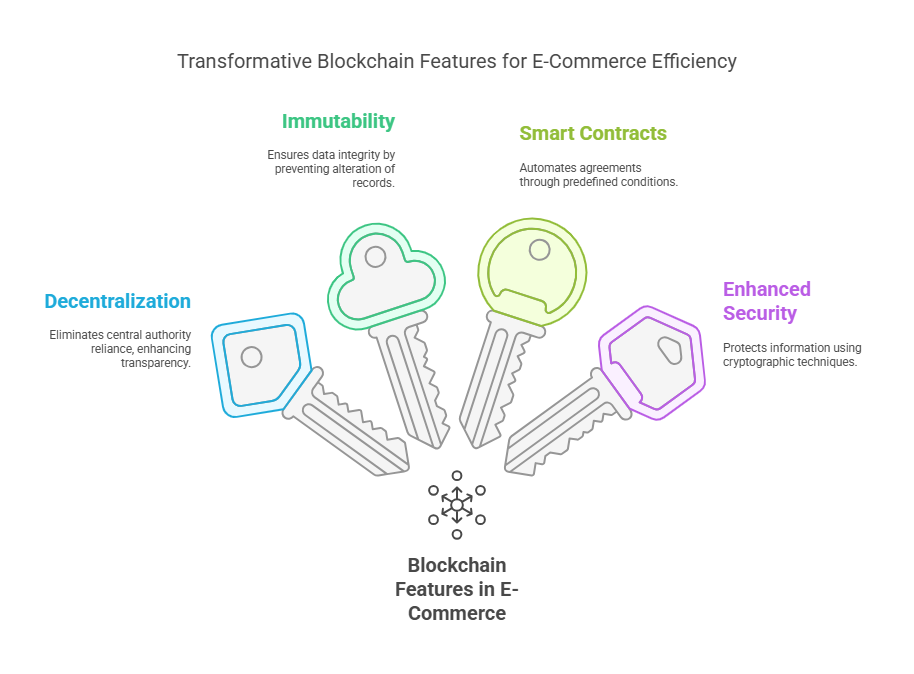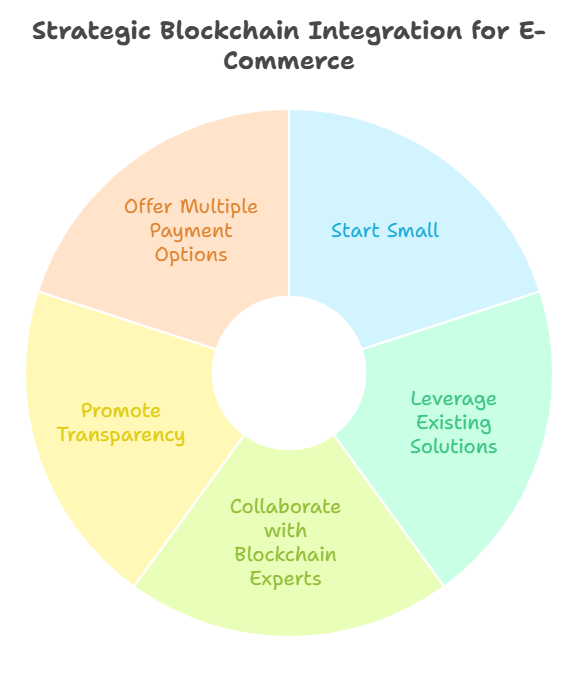Blockchain technology, once synonymous with cryptocurrency, is now disrupting industries far beyond finance. For e-commerce, it offers groundbreaking opportunities to enhance transparency, security, and efficiency. As online retail faces growing challenges such as data breaches, fraudulent transactions, and supply chain inefficiencies, blockchain emerges as a transformative solution that empowers both businesses and consumers.
This article delves into how blockchain technology is revolutionizing e-commerce, exploring its key applications, benefits, and actionable strategies for implementation.
Understanding Blockchain Technology
1. What Is Blockchain?
Blockchain is a decentralized, immutable ledger that records transactions across multiple nodes. This structure ensures data is secure, transparent, and tamper-proof, making it ideal for applications in e-commerce.
2. Key Features of Blockchain in E-Commerce
- Decentralization: Eliminates reliance on central authorities, enhancing transparency.
- Immutability: Transactions, once recorded, cannot be altered, ensuring data integrity.
- Smart Contracts: Automated agreements executed when predefined conditions are met.
- Enhanced Security: Cryptographic techniques protect sensitive information from unauthorized access.

Benefits of Blockchain in E-Commerce
1. Enhanced Payment Security
Blockchain’s secure architecture reduces the risk of fraudulent transactions. By using cryptocurrencies or blockchain-enabled payment platforms, businesses can offer secure, transparent payment methods.
- Example: A customer paying with Bitcoin via blockchain bypasses traditional payment gateways, reducing fraud and transaction fees.
2. Improved Supply Chain Transparency
Blockchain enables real-time tracking of goods, ensuring authenticity and reducing counterfeiting.
| Problem | Blockchain Solution |
|---|---|
| Counterfeit Products | Tracks product origins with tamper-proof records. |
| Lack of Supplier Visibility | Monitors supply chain activity in real-time for better accountability. |
3. Faster Cross-Border Transactions
Traditional cross-border payments involve lengthy processing times and high fees. Blockchain streamlines these transactions, enabling near-instant settlements.
4. Greater Customer Trust
With blockchain, customers can verify product authenticity, view transparent pricing, and access detailed supply chain information, fostering trust.
5. Cost Reduction
Blockchain reduces costs associated with intermediaries, chargebacks, and manual record-keeping. Smart contracts automate processes, saving time and resources.
Key Applications of Blockchain in E-Commerce
1. Secure Payment Gateways
Blockchain enables businesses to accept cryptocurrencies, reducing reliance on traditional payment processors. Popular platforms like BitPay facilitate seamless crypto payments.
2. Transparent Supply Chains
Blockchain records every step of the supply chain, allowing businesses and consumers to trace the journey of products from origin to delivery.
3. Decentralized Marketplaces
Blockchain supports peer-to-peer (P2P) e-commerce platforms, eliminating intermediaries and enabling direct transactions between buyers and sellers.
- Example: OpenBazaar is a blockchain-powered marketplace offering secure, commission-free transactions.
4. Loyalty and Rewards Programs
Smart contracts simplify loyalty programs by automating the issuance and redemption of points. Blockchain ensures transparency, preventing fraud and enhancing customer engagement.
5. Fraud Prevention
Blockchain’s immutability makes it impossible to manipulate transaction records, reducing instances of fraud in e-commerce.
Best Practices for Implementing Blockchain in E-Commerce
1. Identify Specific Pain Points
Determine which areas of your e-commerce operations would benefit most from blockchain. Examples include:
- Reducing payment fraud.
- Enhancing supply chain visibility.
- Streamlining cross-border transactions.
2. Choose the Right Blockchain Platform
Select a platform based on your business needs:
- Ethereum: Ideal for smart contract functionality.
- Hyperledger: Designed for enterprise-grade blockchain applications.
- Ripple: Optimized for cross-border payments.
3. Integrate Smart Contracts
Use smart contracts to automate repetitive tasks, such as processing refunds, managing warranties, or enforcing terms in vendor agreements.
4. Educate Your Team and Customers
Blockchain is still a relatively new concept for many. Provide training for your staff and create resources to educate your customers on how blockchain benefits them.
5. Monitor Regulatory Compliance
Stay updated on local and international regulations surrounding blockchain and cryptocurrencies to avoid legal pitfalls.
Challenges of Blockchain in E-Commerce
1. Scalability Issues
Blockchain networks can struggle to handle large transaction volumes, leading to slower processing times.
2. Regulatory Uncertainty
Evolving laws and regulations around blockchain and cryptocurrencies can pose challenges for businesses.
3. High Initial Investment
Implementing blockchain systems can require significant upfront costs, particularly for small businesses.
4. Limited Consumer Adoption
While blockchain offers numerous benefits, many consumers are still unfamiliar with its applications in e-commerce.
Real-World Examples of Blockchain in E-Commerce
1. Walmart and Food Traceability
Walmart uses blockchain to trace the origin of fresh produce, reducing the time needed to track contamination sources from weeks to seconds.
2. Shopify and Crypto Payments
Shopify merchants can accept cryptocurrency payments via blockchain platforms, enabling global transactions with reduced fees.
3. VeChain for Luxury Goods
VeChain helps luxury brands authenticate products by recording their production and supply chain details on the blockchain.
Actionable Tips for E-Commerce Businesses
- Start Small
Begin by integrating blockchain for a specific function, such as supply chain tracking or cryptocurrency payments, before expanding. - Leverage Existing Solutions
Use established blockchain platforms like IBM Blockchain or Ethereum to minimize development time and costs. - Collaborate with Blockchain Experts
Partner with blockchain development companies to ensure seamless integration. - Promote Transparency
Highlight blockchain features like product traceability and secure payments in your marketing to build customer trust. - Offer Multiple Payment Options
Combine blockchain-enabled payments with traditional methods to cater to all customer preferences.

The Future of Blockchain in E-Commerce
1. Widespread Cryptocurrency Adoption
As cryptocurrencies become more mainstream, e-commerce businesses will increasingly adopt blockchain payment systems.
2. Enhanced AI and Blockchain Integration
AI and blockchain will work together to provide deeper insights into consumer behavior and streamline operations.
3. Decentralized Autonomous Organizations (DAOs)
DAOs may emerge as the next evolution of e-commerce platforms, where governance is decentralized and managed by smart contracts.
Blockchain’s Transformative Power
Blockchain technology is reshaping e-commerce by enhancing security, transparency, and efficiency. From secure payments and fraud prevention to supply chain optimization and loyalty programs, the potential applications are vast. While challenges like scalability and regulatory uncertainty exist, the benefits far outweigh the hurdles. By embracing blockchain technology, e-commerce businesses can build trust, reduce costs, and gain a competitive edge in the evolving digital landscape.
Invest in blockchain today to future-proof your e-commerce store and deliver unparalleled value to your customers. 🚀

